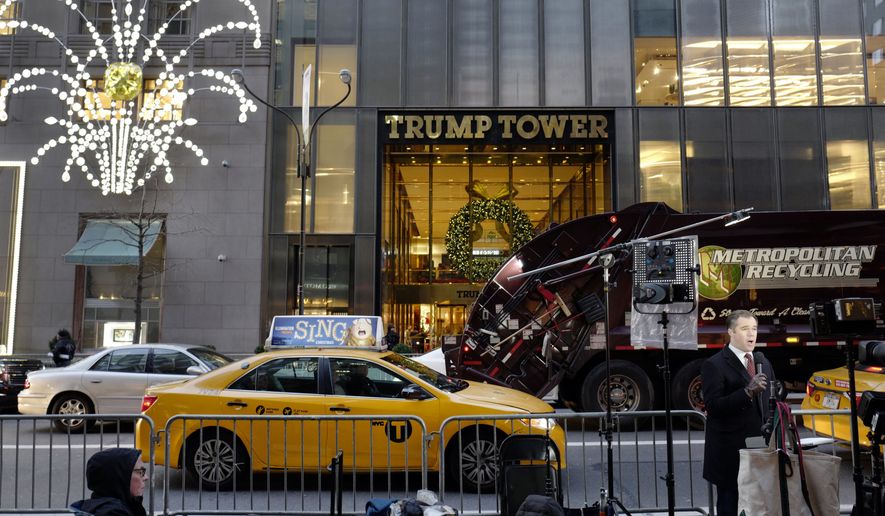OPINION:
The media’s been filled with busy bees lately, painting President Donald Trump with the crazy stick and demanding he produce proof of Barack Obama’s wiretap of Trump Tower — a claim the White House chief threw onto Twitter a few days ago but has yet to back with evidence.
Obama’s denied — reportedly, angrily. The left’s howled, as well as some even on the right. But the fact that Trump’s charge is not automatically deemed ludicrous — that it leaves question marks in such a large segment of American minds — speaks volumes about the state of America’s surveillance-filled society.
What has happened to America, land of the free, country of the Constitution, that wiretapping one’s own citizens has become so believable?
A recent Rasmussen poll — “Did Obama Wiretap Trump?” — showed “the 50-50 nation marches on.”
Republicans “strongly suspect” Obama’s administration wiretapped; Democrats disagree, the poll found. And while James B. Comey, director of the FBI, has privately pooh-poohed the notion of wiretapping, voters tell the pollsters they aren’t completely on board with the agency’s trustworthiness and his reaction doesn’t put the kibosh on the questions.
Here’s the big talking point, from Rasmussen: “[The] survey finds that 44 percent of all likely U.S. voters consider it likely the Obama administration tapped telephones in Trump Tower during last year’s presidential campaign, with 26 percent who say it’s very likely.”
A YouGov poll found a bit differently — that while only one in five think Trump has the goods on Obama about a wiretap, 60 percent of Republicans think the previous president did indeed order the surveillance.
The truth will come out in time. But these poll numbers in and of themselves show something rather remarkable about America’s modern society — and bluntly, it’s a bit dark: We are so accustomed to Big Brother that the idea of a president spying on a president isn’t a shock.
It’s entirely believable. And except for the media-generated fabricated outrage due to the fact Trump’s Republican and Obama, a sacred cow Democrat, the story wouldn’t even be front-page news. Watergate 2.0? No. It’d be a below fold, Page 10 bit, at best.
This is a new America reality, one that’s really sped into existence after the Sept. 11, 2001, terror attacks on U.S. soil, where chaos and the need for rapid security and defense threw us into knee-jerk passage of the Patriot Act — a little-read monster-size bill that was later scolded by its own creator, Sen. James Sensenbrenner, for treading on citizen rights.
In 2013, Sensenbrenner wrote in a letter to then-Attorney General Eric Holder, who was trying to use a Patriot Act provision to let the FBI collect phone records on millions of Verizon customers: “While I believe the Patriot Act appropriately balanced national security concerns and civil rights, I have always worried about potential abuses. … Seizing phone records of millions of innocent people is excessive and un-American.”
Yes, it is. The Fourth Amendment requires a court warrant, signed by a judge, naming the specific items to be searched. But post-Patriot Act, the whole tone and tenor of civil rights have switched to become subjugated to national security.
Modern society means law enforcement at various levels both input and share information in data centers in every state — information that’s oftentimes collected on innocent Americans, absent their knowledge, leaving a somewhat queasy feeling over who in government knows what, and why, and for what purpose.
Modern society means schools, like the ones in Polk County, Florida, can take it on themselves to install iris-scanning technology on buses to grab data on boarding and exiting children.
Modern society means communities, like one in Michigan called Farmington Hills, can add technology to street lights that not only automatically adjusts to the level of darkness — but that also records conversations of passersby, absent their awareness.
Modern society means the sheriff’s office in Pinellas County, Florida, can compile a database of 120 million searchable facial photographs, most of which aren’t even of criminals or convicts.
It’s all for security and safety reasons — to secure the safety of innocent American citizens, from the likes of terrorists and criminals. The data collection points — fusion centers — are supposed to provide authorities with one-stop shopping on suspects, to make them easier to catch and apprehend. The iris scanning on Polk County’s school buses was supposed to provide a service for parents, to alert to the whereabouts of their children. The street lamps in Michigan, a program of “Intellistreets” from the company Illuminating Concepts, were aimed at helping law enforcement avert crime. The Florida facial photograph database was developed as a way of rooting out driver’s license fraud.
The problem with so much of this technology and national security stuff is that it actually does little to fight terrorism — the stated reasons for most of its development and implementation — or even crime, in many cases. But it does go far in trouncing the constitutional rights of innocent Americas who’ve not done anything that justifies the taking of their Fourth Amendment rights.
And the bigger problem in this national security shift is this: Casting a critical eye upon the surveillance nation we’ve become puts you squarely in the box of anti-American. It’s not patriotic to criticize the Patriot Act, or the fall-out of either tone or technology that’s swept across America. It means you’re anti-police — or worse, a gasp, liberal.
But the post-Sept. 11 dings to constitutional freedoms is real. And whether Trump Tower was wiretapped or not ought to give pause to patriots everywhere to consider just how easy it would be for government entities to do such a thing in the first place in today’s society — and then perhaps to reflect what can be done to hit the rewind button and scale back over-the-top surveillance that ropes more innocents than criminals, convicts or terrorists.




Please read our comment policy before commenting.